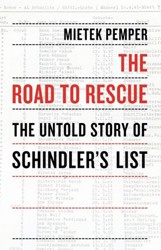The Schindler story has been told before, many times and in great detail, but never quite like this, through the eyes of the youngest of the Schindler Juden, Leib Lejzon. Leib, now Leon Leyson, recreates his world and his childhood in pre-war Poland so vividly that you can feel the economic hardship, the strong family ties and the joys and pitfalls that epitomized many Jewish families of that era. Here, in this narrative, it all truly comes to life.
Slowly, we see this life begin to unravel. What I found particularly poignant was the tenacious hope that the people clung to. At the very beginning of the war Leib’s father “reassured [the children] that the war wouldn’t last long…by the end of this year it would all over. Just as the Germans had left at the end of the Great War, so they would leave again…There were Jewish parents all across Krakow who delivered similar messages to their children, not only to comfort them but also to reassure themselves.” This addresses the question of how and why so many Jews were able to delude themselves. And the recurrent refrain “if this is the worst that happens…” illustrates how hard the Jews tried to believe, wanted to believe that if they could wait it out, it would all go away. As the situation steadily went from bad to worse, Leon describes how arbitrary actions and choices would decide one’s fate and how each person would react differently to the outcome. Some would give in to despair while others, often ordinary people, would find the strength to become heroes. And that brings us to Oskar Schindler.
Leyson is able to relate the Schindler story in such personal terms that it becomes much more immediate, much more real to the reader. It’s interesting that although Leyson writes this memoir as an adult, he reverts to the simple, direct voice of the youth he was, a voice that will resonate with the young adults that are the target audience of this book. Yet this story, in its rendering of pre-war Poland, the terror of the camps, and the struggle to acculturate and rebuild a new life after the war, speaks to us as adults as well. Leyson makes us all connect to that young boy on the wooden box. Recommended for ages 10 and up.



